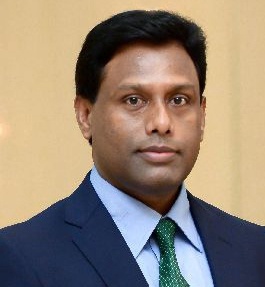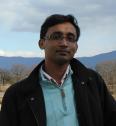Scientific Bangladesh, in its pursuit, to give Bangladeshi researchers at home and in abroad scope to talk about their present research, future plan, giving directions to future researchers and government, has interviewed Dr Hasan Mahmud Reza, Chairman- Department of Pharmaceutical Sciences, North South University s. He shared his feelings regarding his research work, academics and current condition of the Pharmacy market. The interview was taken by Ali Asif, a graduate student in the Department of Pharmaceutical Sciences, North South University.
Scientific Bangladesh: What made you interested in learning different molecular and embryological techniques?
Dr Reza: Let me be honest by saying that I nourished the determination in me that I must go for higher study. When I was an MPharm student, I found that most of our teachers had PhD in natural products. I was gathering more information regarding my field of higher studies and I realized that molecular biology was gaining popularity as a field of research and I decided to work in that field. That was my drive to find a lab enabling students to pursue postgraduate studies in molecular biology. I was fortunate to learn both molecular and embryological work since my supervisor is one of the few who pioneered the embryological work in Japan and developed his lab. So it was my thirst to learn molecular work, however, the embryological work came sequentially that grasped me intensely.
Scientific Bangladesh: Would you like to discuss your research findings and achievements from Molecular and Developmental Biology?
Dr Reza: I worked to establish the gene cascade in lens development using chick as an experimental model. Along with many known molecular techniques, we used a comparatively new technique in ovo electroporation in my study. Mainly we focused on transcription factors that play major roles in induction and differentiation of lens. We found that Pax6 and Sox2 simultaneously activate the principal differentiation factor, L-Maf in presumptive lens ectoderm upon the receipt of the inductive signal from the optic vesicle. Later, L-Maf transactivates crystallin genes, and Sox2 plays a synergistic role with L-Maf in the process. Further, we established that Pax6 function in the optic vesicle is indispensable for optic cup formation and Pax6 positively regulates the expression of FGF8, a diffusible factor, which presumably acts to maintain L-Maf in differentiating lens during development.
Scientific Bangladesh: Could you give a brief discussion about your research work in Singapore Eye Research Institute?
Dr Reza: I was actually looking for an opportunity to utilize my basic knowledge that I mastered in Japan. Accordingly, I joined the Singapore Eye Research Institute under the National University of Singapore. I learned how adult stem cells could be isolated and cultured for clinical transplantation in patients with ocular stem cell deficiency by tissue engineering. Our research was aimed to find an alternative source of stem cell for transplantation in ocular surface to regenerate damaged cornea in certain disease conditions in human. I as the key person of the project started the work by characterizing a new cell-type from human umbilical cord tissue, which we termed mucin-expressing cord lining epithelial cell (CLEC-muc). Later, we succeeded to generate stratified cell sheets of CLEC-muc on the denuded human amniotic membrane and, these were grafted onto rabbit eyes lacking ocular surface and finally, we observed a clear cornea reconstructed by the transplanted cell sheets. I have also demonstrated that CLECs-muc can be an effective alternative to 3T3 feeder cell for stem cell culture, which eliminates the risk of zoonotic infection. In a separate project, we explored the role of cord blood serum and human adult serum in supporting the growth and proliferation of conjunctiva and limbal epithelial cells in comparison with fetal bovine serum.
Scientific Bangladesh: What is your feeling about the eye research of Bangladesh, how should we approach to bring more consciousness and development in this sector?
Dr Reza: In Bangladesh, there are good numbers of Eye hospitals, some are quite big located in Dhaka and Chittagong, and even we have National Eye Research Institute. A good number of talented clinicians are working there. Several professional societies of ophthalmology are also conducting their activities. Unfortunately, I do not see any project of translational research that can be taken to the bed-side. Bangladesh is a populous country where human samples of almost all diseases are available. This can be capitalized in research and the outcome can directly benefit our poor people. For that, we need to understand the importance of research. The government needs to prioritize the field of translational research and fund accordingly. Similarly, private sectors can come forward to facilitate translation research and hence with the research products they can widen up their business. Our poor people can get better treatment at low cost. Recently HEQEP funded by World Bank is supporting different types of research in various institutions, but again the lion-share is going to public university which I think, is depriving the private sector since several private universities are now recruiting talented researchers from abroad, these people should be given the opportunity to utilize their expertise in research in their premises.
Scientific Bangladesh: You had enough opportunity to work in the research sector of different countries; instead, what motivated you to come back to Bangladesh?
Dr Reza: The only answer in favour of my return is my feelings and responsibilities for my country. But again, my aspiration is getting faint day by day when I see corruption, injustice, malpractice everywhere.
Scientific Bangladesh: In Bangladesh, besides teaching you are also carrying out the administrative duties as a Chairman of Pharmaceutical Sciences Department of North South University, How do you maintain?
Dr Reza: I am passionate about research and teaching. Research is sometimes frustrating, I believe teaching can refresh minds and energize to do better research. Administrative work is always clumsy, there is hardly any scope to deliver the things straight forward unlike science. I am learning new things every day, surely everything is not delicious.
Scientific Bangladesh: Would you like to let our readers know about the measures that you have taken, programs/seminars you have organized for the students of the Pharmaceutical Sciences Department?
Dr Reza: After taking charge of this department, I have tried to establish a transparent system of operation necessary for sustainable growth of the department. As part of this, we have made several small committees of faculty members with segregated responsibilities to run the departmental activities smoothly and organizing regular meetings. Globally accepted 5-years BPharm Professional program has been introduced this year at NSU. We have recruited the highest number of PhD from reputed universities of USA, UK, Australia, Germany, Japan etc. All faculty members are encouraged and facilitated to do independent research work. For the first time in Bangladesh, we have set up a mini R&D laboratory at NSU for hands-on learning of our students in the area of the pharmaceutical technologies, which will make them technically competent. On a regular basis, we have been conducting seminars on different issues pertaining to the pharmaceutical sciences to provide expert knowledge to our students also, on general issues to increase awareness among the students and staffs. This year, we have completed MoU with Nara Institute of Science and Technology, Japan and, several others are in progress. I have also been taking different initiatives to provide job opportunities to our graduates.
Scientific Bangladesh: What type of research facilities as well as lab development you have made over the years and how?
Dr Reza: In a short span of time, we have set up thirteen teaching laboratories equipped with all modern and necessary instruments. We have four labs to facilitate advanced research in the areas of pharmaceutics, pharmacology, biomedical and natural sciences. NSU authority has financed to set up all these laboratories.
Scientific Bangladesh: In future what you like to do for the advancement of the Pharmaceutical Sciences Department?
Dr Reza: I would like to make this department the centre of excellence for pharmaceutical and biomedical research in cooperation with all stakeholders that will produce the most competent pharmacists to work globally.
Scientific Bangladesh: What are your suggestions to your students and fresh graduates?
Dr Reza: My students must be regular in the class and self-study. They must learn the discipline to succeed in life. I always suggest my students be a good person first and then a good pharmacist. In recent time I have been observing that our graduates are more interested to work in the marketing department. I think this trend will weaken our industry because pharmacists can contribute better with their knowledge and skills for quality production of pharmaceuticals than others. I hope our graduates will realize it and look for a job in the pharma industry/plant for making sustainable development of pharma sector and develop a successful career.
Scientific Bangladesh: What is your suggestion for the young researchers?
Dr Reza: Young researchers are incredibly crazy for publication. I believe they should put more interest in understanding the field of research, learning and generating knowledge by their work than just making publication. The publication is a logical sequence, so no need to be worried. Too much pressure felt for publication may lead to fake data generation, which is unethical and a serious crime.
Scientific Bangladesh: Do you think pharmacists are paid well?
Dr Reza: Overall salary scenario for pharmacists in the country is not encouraging. A pharmacy student needs to study hard and complete significantly higher number of credit hours as compared to graduates from any other discipline; however, the salary paid by many pharmaceutical companies does not reflect it. I think pharmaceutical companies should recognize the contribution of pharmacists precisely and, also compare the salary paid to graduates from other disciplines in different sectors, and fix up a competitive salary for pharmacists.
Scientific Bangladesh: Would you like to mention anything that we forgot to ask?
Dr Reza: It is good that pharmacy education has been spread significantly in Bangladesh, however, quality of education is not maintained in all institutions, which is alarming and ultimately will fail to produce competent pharmacists. This area needs to be monitored strictly. As more and more pharmacists are coming up in the market from many public and private universities every year, it is high time to explore new job areas for this increased number of pharmacists. I think step should be taken right away to establish hospital pharmacy countrywide and community pharmacy in metropolitan cities as a pilot project. Also, pharmacy curriculum needs to be improved by incorporating more relevant subjects to make pharmacists well prepared to work in diverse areas of biotechnology since many new biotechnology products are emerging as pharmaceuticals in the market.


